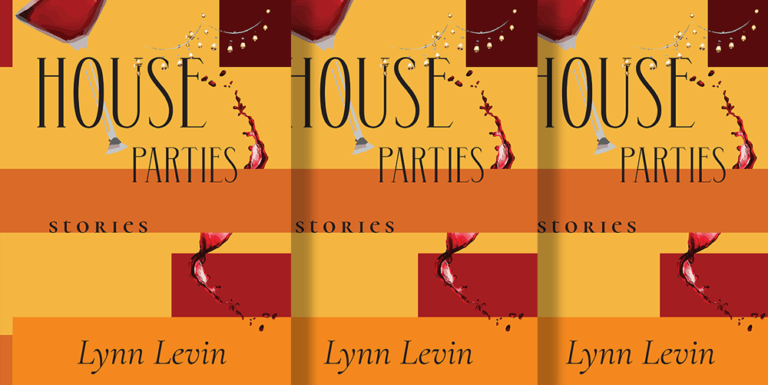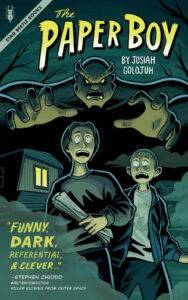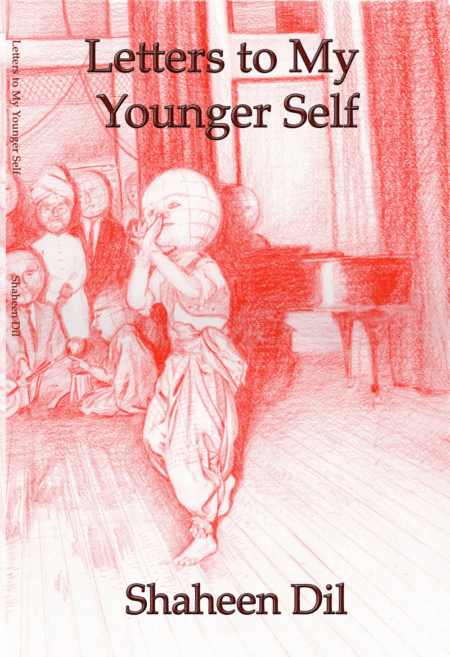Named as one of the best books of Summer 2023 by Philadelphia Magazine
“House Parties may break your heart, but it’ll never do it the same way twice.”
-Philadelphia Magazine“House Parties offers the wisdom and humor of a keen eye and a kind heart. Lynn Levin writes beautiful prose so skilled that it seems unselfconscious while being replete with perfectly balanced sentences, brilliant metaphors, and similes. Levin’s spirited imagination is a delight. These stories are amusing, startling, poignant, heartwarming. House Parties is a book to read, savor and return to again.”
-The Massachusetts Review“With twenty stories spanning the late 1970s to today, Lynn Levin’s House Parties, her debut collection of short stories is a tour de force, combining her poetic talent for precise language and imagery with her capacity to create a wide range of imperfect, enthralling characters. There are too few recent story collections today with House Parties’ ambition to jump between generations, cities, points-of-view, character occupations, and narrative pacing styles. The stories are heavy with people from all walks of life and rich with entertaining and realistic dialogue… All in all, House Parties is not to be missed. It’s not often you read a story about three millennial guys hiking, followed by a story of Jewish Americans in the latter half of the 20th century.”
-Painted Bride Quarterly“House Parties is a triumph of compassion, potent perfection, and unforgettable stories. Leave it to Lynn Levin to publish an enormous collection of short stories that seemingly takes five minutes to read. You go back and reread. The stories exert their spells all over again. They plunge you into intense, idiosyncratic universes both familiar and alien, thrust and haul you along by forces they generate: what their characters want, why they can or can’t get it, what it does or doesn’t mean, what happens when one character’s cumulonimbus of needs, wants, regrets, and foibles crashes into another character’s.” -Write Now Philly
More info About the Author: Lynn Levin is a poet and writer. House Parties is her debut collection of short fiction. Levin’s previous books include the poetry collections The Minor Virtues and Miss Plastique, as well as Poems for the Writing: Prompts for Poets (as co-author) and a translation from the Spanish, Birds on the Kiswar Tree poems by Odi Gonzales. Her poems, short stories, essays, and translations appear widely. Lynn Levin was born in St. Louis, Missouri and lives in Bucks County, Pennsylvania. She teaches writing and literature at Drexel University. Her website is lynnlevinpoet.com.
Author Site
An excerpt from the short story “The Lady with a Hundred Pockets” from House Parties:
 Doris and Mickey drove to the recreational complex in separate cars. They arranged to meet at the playground and cut through to the picnic area where the day-of-fun benefit for Cameron Ferderbar was taking place. Cameron, Doris’s neighbor, had fallen off a ladder when cleaning out his roof gutters, and now he was laid up in a rehab facility, which, let’s face it, was actually a nursing home that smelled like diapers. Bankruptcy was pawing at the family’s door, and the GoFundMe had come up short, so Cameron’s men’s club was putting on the benefit hoping to cover some of the healthcare bills.
Doris and Mickey drove to the recreational complex in separate cars. They arranged to meet at the playground and cut through to the picnic area where the day-of-fun benefit for Cameron Ferderbar was taking place. Cameron, Doris’s neighbor, had fallen off a ladder when cleaning out his roof gutters, and now he was laid up in a rehab facility, which, let’s face it, was actually a nursing home that smelled like diapers. Bankruptcy was pawing at the family’s door, and the GoFundMe had come up short, so Cameron’s men’s club was putting on the benefit hoping to cover some of the healthcare bills.
Doris arrived at the playground wearing a Quality Sugar sun visor, a red-and-white striped shirt, and white slacks. Quality processed sugar, and Doris worked in inventory control. As she waited for Mickey, Doris noticed children crowding around a woman dressed in an enormous multicolored patchwork skirt covered in rows of pockets. Next to her was a sign on a chair that read, “The Lady with a Hundred Pockets. Fifty cents per chance.”
The woman smelled like a tropical fruit salad. She reminded Doris of a fertility goddess. She wore her hair in a massive braid, thick as a bicycle tire, that she fixed in a circle on top of her head like an Italian Easter bread, except there was no pink or blue dyed egg in it.
Children were begging their adults for change and darting over to the pocket lady. After she zipped their coins into her belt bag, she let them plunge their hands into her pockets. They came up with mini pinwheels, plastic knights, frogs, lions, junk jewelry, and tiny squirt guns. A few kids liked their loot, at least for a moment, but some did not. They wanted to put the junk back and try again. But the pocket lady tilted her head, shook her finger, and said, “For another chance, you must pay again.” Most of the adults shelled out for two chances, but when the kids wanted more money, their adults escorted them to the play equipment, and, if they kept making a fuss, back to the car.
Mickey showed up twenty minutes late, but at least he showed up. It was a hot August afternoon, and he was mopping his brow. Doris offered him an air hug. Like Doris, Mickey was in his early sixties. They had met two months ago on a dating site for mature people. Age was just a number, that’s what everyone said. Like it was only about age.
Doris had been through one divorce, Mickey three. A solidly built man, he wore his thinning iron-gray hair in comb-over. Not a ridiculous comb-over, one of those trimmer comb-overs. He was a delivery driver for UPS.
“Who’s the gypsy?” he asked.
“That’s the Lady with a Hundred Pockets. For fifty cents, you get to pick one of her pockets. I’m going to try my luck.”
She meant this to sound playful, but Mickey mumbled something about her acting ridiculous and like a little kid and there being better ways to spend money. He stood with his hands in the side pockets of his plaid knee-length shorts while Doris gave the woman two quarters. The lady told her to go for it. Doris stuck her hand into a paisley pocket and pulled out a gold plastic ring with a big faceted plastic ruby in it.
She showed it to Mickey. “My lucky ring. Maybe it will grant me three wishes.”
Mickey gave her a whatever look. “Now I know something new about you. You believe in wishes and luck.” He mopped his brow again.
“I do happen to believe in wishes and luck,” she said, and Mickey gave her another whatever look. It would have been nice if he played along in the spirit of fun, but he evidently did not budge on his principles. She began to think of her wishes, but she kept them to herself. She wished for a caring guy with a sense of humor, speedy healing for Cameron, and a winning state lottery ticket for the Ferderbars. Maybe a winning lottery ticket for herself, too. What did she spend, maybe ten or twenty dollars a week on the state lottery?
“Why don’t you put that silly thing back and let a kid get it?”
This made Doris feel ashamed. She put the ring back in its paisley pocket. Maybe some little girl would pull it out and be delighted.
“You don’t have to put it back,” said the lady. Doris shrugged like it wasn’t a big deal. Then she saw the lady aim an evil eye at Mickey. It was like a laser locking onto a target. Maybe she had real gypsy powers. Doris hoped that things would improve during the day of fun.
She had paid for the beef-and-beer tickets, which was only right since this was her cause and the decision to go had been her idea. She wondered what it would be like, Mickey meeting so many of her friends all at once. Maybe he was skittish about that. So far, their dates had been one on one, your basic dinner-and-a-movie thing, and they always went halfsies. It would be nice if he treated her now and then.
The men’s club had produced a shindig. A sound system played country music. There was a dunk tank, horseshoes, drawings for gift baskets, bingo for prizes, and a bean bag game called cornhole. It cost extra for the games. There was a prayer station, too. No charge for that, of course. Connie Ferderbar sat in a lawn chair with a giant get-well card that everyone signed. The aroma of barbeque wafted through the air.
Doris and Mickey headed to the food table, Doris waving to acquaintances along the way. There must have been two hundred people there—neighbors, friends, people from the community.
“Didn’t Cameron have health insurance?” asked Mickey.
“Connie said he dropped their coverage as soon as the government lifted the no-insurance tax penalty. Not too swift, I know.”
“Talk about false economy. And they didn’t find him for three hours? He lay there for three hours? Working alone on a ladder, no spotter?”
“He took risks. But you can fall off a ladder even if you have a spotter,” remarked Doris.
“The guy’s an idiot,” said Mickey. “You take precautions. You carry coverage.” A yellow jacket flew up to Mickey, and he swatted it away.
“There’s good luck and bad luck.” Doris thought of all the times Cameron and Connie had been there for her both during her divorce and after. Cameron had helped her with a leaky faucet, a busted screen door. He’d helped her change lightbulbs she couldn’t reach. “Well, he’s my friend, and that’s the reason we’re here. Do you really have to call him an idiot?”
Mickey loaded his plate with a heap of barbequed beef, big mounds of macaroni salad and cole slaw, and stuck tortilla chips into the salads. He took a can of Pabst and headed to the picnic tables, which were under a pavilion. Worried that Mickey had taken more than his share, Doris took less than she wanted, then sat down next to Mickey.
The Chens, the Rothmans, and the DiPietros joined them. After the introductions, Frances Chen updated everyone on Cameron’s situation. He’d broken a leg and three ribs, screwed up a shoulder, suffered a concussion, and, worst of all, had a spinal cord injury. The spinal cord injury made it hard to predict if he would walk again. Plus, an infection had cropped up in the diaper-smelling rehab. Don’t even ask about the bills. Before the accident, Cameron had managed a restaurant.
“How do you guys know each other?” asked Rose Rothman inclining with interest toward Doris and Mickey.
Marrieds always asked. Singles also asked each other how they met. But that was different, everyone on the same playing field.
“Online dating. That’s the way people find each other these days,” replied Doris. She spoke in the kind of voice that said she wanted to move on from that topic.
Bea DiPietro said she’d heard quite a few stories about online dating, women meeting creeps and such. Sometimes nice guys too, countered Doris. Bea wanted to know what site she used, and Doris replied in a general way that it was one of the over-fifty sites. In truth, she couldn’t recall if it she’d met Mickey on SilverSingles, or OurTime, or one of the others. No law against having two or three accounts at once. It increased your possibility of finding Mr. Right or, at least, Mr. Available. Sometimes Doris saw the same guys overlapping on the sites. Maybe they noticed her overlapping, too.
“That’s how it’s done now,” said Mickey, rescuing Doris. He took a swig of beer. “You meet people online.”
“Mickey’s a pitcher in a softball league,” Doris piped up, and the husbands, clearly impressed, picked up on the sports theme.
After lunch, Doris and Mickey ambled over to the activities area. Doris bought some chances on gift certificates for local hair salons and restaurants. Mickey said she was wasting her money, why not just patronize the places directly? Doris stared at him.
“You do it to help them raise money,” she explained like he was some kind of dolt who didn’t get it. “The guy had an accident, and now everybody’s helping out.”
“Well, the guy didn’t play his cards right. So now everyone has to bail him out?”
“You think you always deal your own cards, Mickey?” Doris was surprised at her sharp tone. “What about a flood or a hurricane? What about cancer?”
“You buy insurance for those things. You don’t buy a house in a flood plain. You manage your risks.”
Now he was acting ridiculous. And hard-hearted.
“You can’t always control what happens to you. What if you go to a festival and a shooter opens fire?”
“Do you know something I don’t?” he said, trying to be funny.
They walked past the horseshoes and the dunk tank to the bean bag toss with the weird name. Mickey wanted to show his pitching chops. The game was popular, and they took their place in line. Doris wondered if he would pay, since cornhole was his idea, or if, at least, they’d go halfsies. The fellow in charge explained the rules of the game, which were fairly involved with all sorts of scoring levels. You aimed to toss the bean bag into the hole, and the holes were on two slanted boards. One board had a sun, the other a moon.
“Hey, Sugar,” said a voice behind Doris. There stood Louella from work, also sporting a Quality sun visor. She was with a fellow named John, whom Doris had dated in the past. They had met on OurTime. Or was it SilverSingles? Louella and John were holding hands.
The women made the introductions.
“How do you do?” said Doris, trying to act as if she were meeting John for the first time.
“Pleased to meet you, Doris,” returned John. They discovered that they were each there to support Cameron, who was a mutual friend. “A good time for a good cause, but a good cause for a sad reason.”
They decided to play teams. First girls against boys, then couples. John took out his wallet. Mickey left his wallet in his pants.
This excerpt is published here courtesy of the author and should not be reprinted without permission.

























